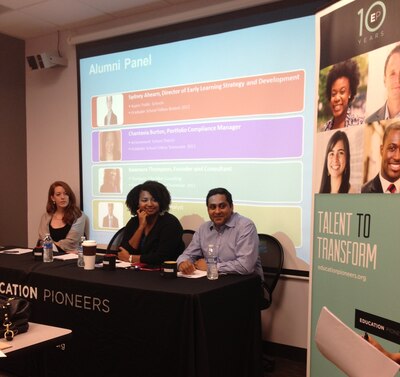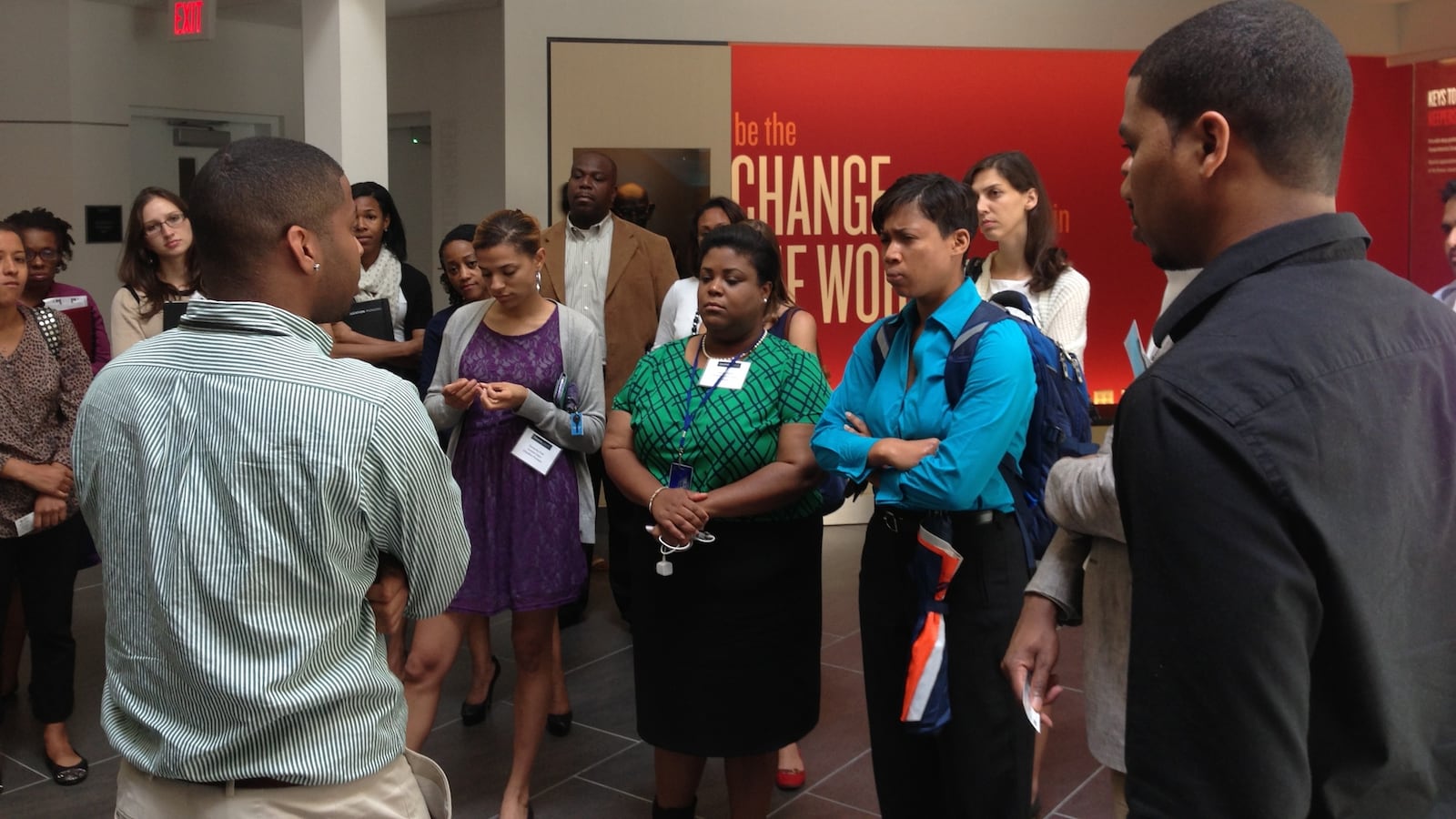Tavie Clay is not a teacher anymore. She arrived in Memphis ten days ago to work as the human resources director for Freedom Preparatory Academy, a group of charter schools. Clay will likely spend more of her time interacting with adults than with children. But she sees her work as deeply connected to the classroom, to kids, and to the community.
Since she’s arrived, “I drive around,” she said. “I’m trying to get an understanding of what I’m doing, why I’m here. I go to where I’m going to go—where my kids are going to be from. I’m hiring teachers, but they’re still my kids.”
Clay came to Memphis through Education Pioneers, a nonprofit that recruits and places professionals in leadership and management jobs in education organizations. She is one of 21 graduate fellows who began their program this month, as part of the group’s second cohort in Memphis. Education Pioneers officially launched in Tennessee in 2013 with ten fellows, and it has already more than doubled in size: This year, in addition to the graduate fellows, between five and eight analyst fellows will be working in Tennessee districts and schools.
Fellows work in education, but outside of the classroom. “We want to make education the ‘best-led sector,'” said Maya Bugg, Education Pioneers’ Tennessee director. “We’re filling a niche. There are people focused on the talent side for teachers and for principals. But talent outside the classroom also needs to be top-notch in order to help move initiatives and reforms along.”
There are three program tracks for fellows: A ten-week program, which tends to focus on a single project; a yearlong placement, which often leads to longer-term jobs; and an analyst fellowship, aimed at people who have experience working with data and numbers. The organization is specifically focused on schools and organizations that serve underprivileged children and communities.
“It’s helpful to have their national network,” said Roblin Webb, the executive director and founder of Freedom Preparatory Academy. Freedom Prep has hired a data analyst fellow last year who has since been hired full-time in addition to Ms. Clay. “It’s difficult to find talent in certain areas in Memphis. So it’s helpful to tap into a national network of strong professionals who are mission-aligned.” Webb said it also helped that Education Pioneers candidates have been vetted by the organization.
A diversity of perspectives
Education Pioneers recruits and places fellows, and provides professional development and networking throughout their placements. The organizations, in turn, contract with the group for placement and pay the salaries or stipends for their fellows. Education Pioneers also receives some funds from the Bill & Melinda Gates Foundation, the Walton Family Foundation, and from local Memphis foundations. (Chalkbeat receives funds from the Bill & Melinda Gates Foundation and the Walton Family Foundation.)
Many fellows are career-switchers. Others may be ambitious teachers or school-level employees. “We help people take their skill set and translate it to education,” Bugg said. “The partners have to be able to provide a strong supervisor, so there’s mentorship and support.”
Chantavia Burton, a former fellow who now works at the state-run Achievement School District, said, “I’d call it a bridge. It took me from being minimally knowledgeable about the world of education and the landscape in my city and the state to being able to talk about education. It introduced me to the key players in the city.” Burton is a native Memphian with degrees in both law and business.

The group, which celebrated its tenth anniversary last year, works with 180 education organizations in 20 cities. In Tennessee, Education Pioneers has partnered with school districts (Shelby County Schools and Metro Nashville Public schools), the state-run Achievement School District, other talent recruitment and training agencies (Teach For America, TNTP), charter schools (Freedom Preparatory Academy, Cornerstone, LEAD Public Schools, Yes Prep, Green Dot, Scholar Academy, and Aspire), and the office of the mayor in Memphis.
The projects vary: This year, the mayor’s fellow will help create a program connected to president Barack Obama’s My Brother’s Keeper initiative in Memphis, focused on supporting and mentoring young African-American boys. Burton’s project with the ASD focused on RyeCatcher, a technology that connects schools with after-school and out-of-school providers.
Fellows receive professional development on topics ranging from technology and education, school district structures and governance, and closing the “opportunity gap.” Fellows also train each other through a series called Education Pioneers Unplugged. For instance, a former teacher plans to lead a session on Common Core. “They’re learning through the program, but they also have a lot of expertise to offer,” Bugg said.
The goal is for the fellows to stay in education, and in Memphis. “The goal is to grow and to do so alongside the organizations that are also growing here,” Bugg said. Nationally, the organization hopes to have 10,000 alumni by 2023, up from some 2,000 last year, according to Education Week.
Bugg said that overall, 73 percent of alumni stay in education. But in Tennessee so far, closer to 90 percent of alumni have stuck around.
Freedom Prep’s Clay already had a long resume of education administration jobs, most recently in the Houston Independent School District. But she said she valued the range of experiences in her cohort. “People are from all over the country, but there are also a few native Memphians. There’s a diversity of perspectives. You have bank examiners, software engineers, biologists. You can just learn from them and pick their brains.”
Clay plans to stay in Memphis longer than a year. “I’m a year-long fellow, but in taking on the role, Ms. Webb wanted to make sure that I’m committed to Memphis for longer than a year,” Clay said. “This could be my new home.”
She said the program was helping her learn about Memphis’ history and education landscape. She said she was already thinking about how race, poverty, and history connect to her work. “Maybe people like us coming to Memphis from outside the city can help incite that desire to turn that love for the city into, I love this city so much I’m going to do something to improve it,” she said.


